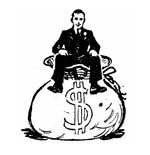
Chastity as a Form of Economic Subversion
THE AMERICAN ECONOMY OF DESIRE
Not long ago I was standing in a supermarket checkout line when my wandering eyes fell upon the cover of a mainstream women’s magazine, Cosmopolitan, offering advice on how to satisfy the demands of lust. Perhaps I should have read the article, but instead I fell into my usual pattern of just ruminating. A major voice of popular culture was quite obviously proclaiming that Christianity, and almost every other world religion, is wrong. Lust, not chastity, is the goal of human sexual relationships. The traditional Christian virtue of chastity — abstinence from all genital activity other than sexual intercourse with one’s spouse — is to be replaced by its opposite — unbridled and polymorphous genital activity.
Reflecting further, I realized that it was inevitable that lust and chastity would have to trade places. After all, in a consumer society, chastity is the countercultural value. Chastity is the practice of restraint, not just any restraint, but the restraint of desire, and not just any desire, but an extremely powerful desire — the desire for sexual gratification. Now, this notion — that powerful desires are suspect and must be restrained, and that one should act on them only after careful reflection — is bad for business. How, I ask you, are we going to convince people to buy with abandon when they won’t indulge their sex drive with abandon? Business, through advertising, attempts to make us want things, but all the advertising in the world will be for naught unless people come to believe that if they want something they should go out and get it (or as my philosopher-friend puts it: “desires are sufficient reasons”). It is hard to maintain the attitude that my desires exist in order for me to gratify them (the consumer attitude) while holding on to the attitude that my desires are suspect and must be restrained (the chaste attitude). A house half-chaste and half-consumer is a house divided, and a house divided cannot stand for long.
The logic of chastity is fatally opposed to the logic of consumerism. To live chastely requires that one master and control one’s desires. As St. Thomas Aquinas points out, “chastity takes its name from the fact that reason chastises concupiscence.” The logic of chastity implies an ascetic attitude toward life.
The logic of consumerism is quite the opposite. Advertising, the propaganda of the consumer society, attempts to arouse desire and to convince us that a certain purchase will satisfy it. Most large-scale advertising campaigns appeal to desires for gratification. We are told, subtly or not, that a certain purchase will feel good or taste good, or make us look good and enhance our appeal to others.
You May Also Enjoy
A curious schizophrenia afflicts the corporate body of American Catholic institutions when it comes to the question of how to deal with a trade union.
This statement was attacked by business leaders and the prime minister, and was the subject of a full-scale debate in the Canadian Parliament.
Day and Maurin welcomed people of other faiths to work as Catholic Workers, but there was never any doubt that the movement was clearly Catholic.

